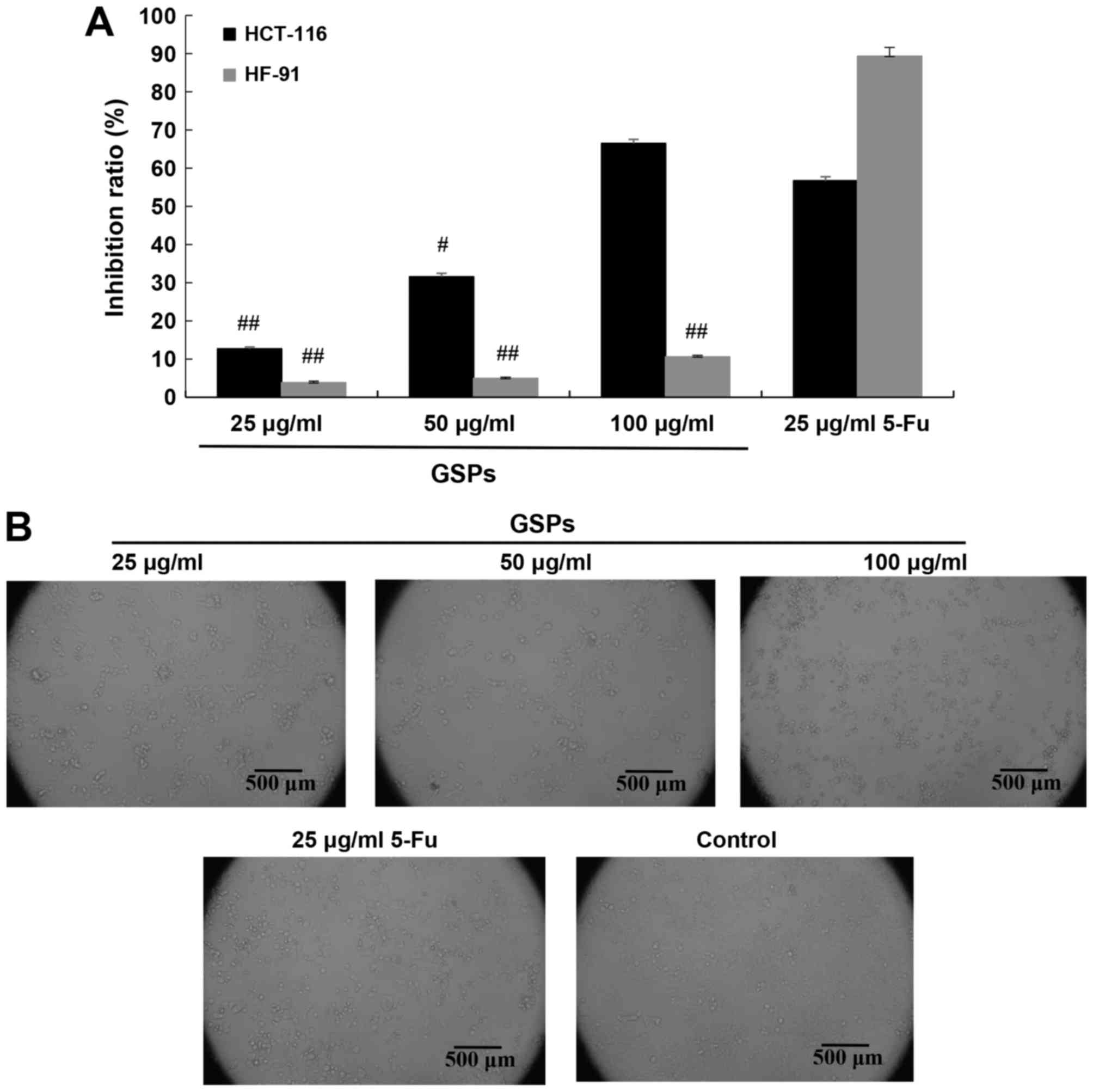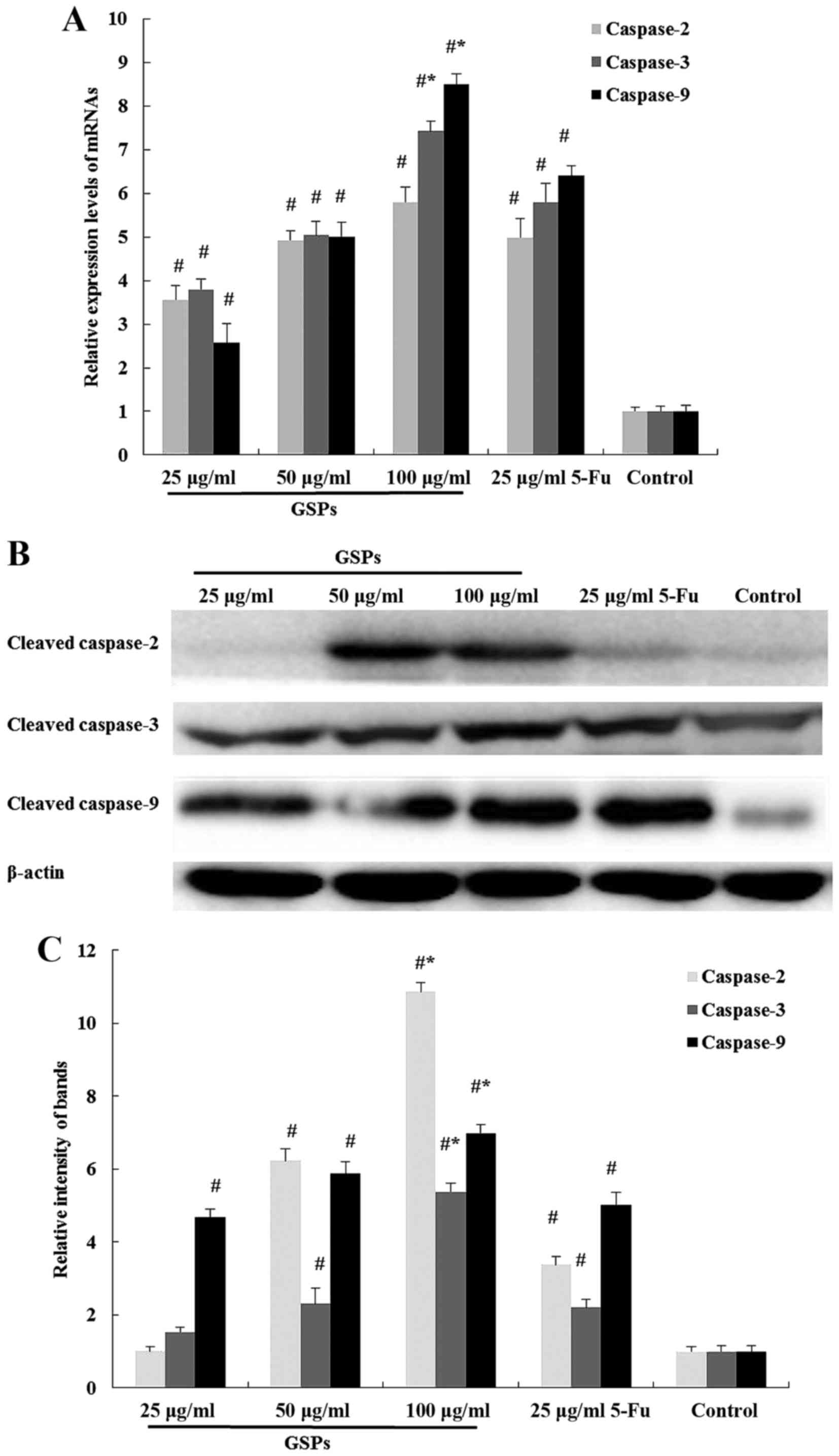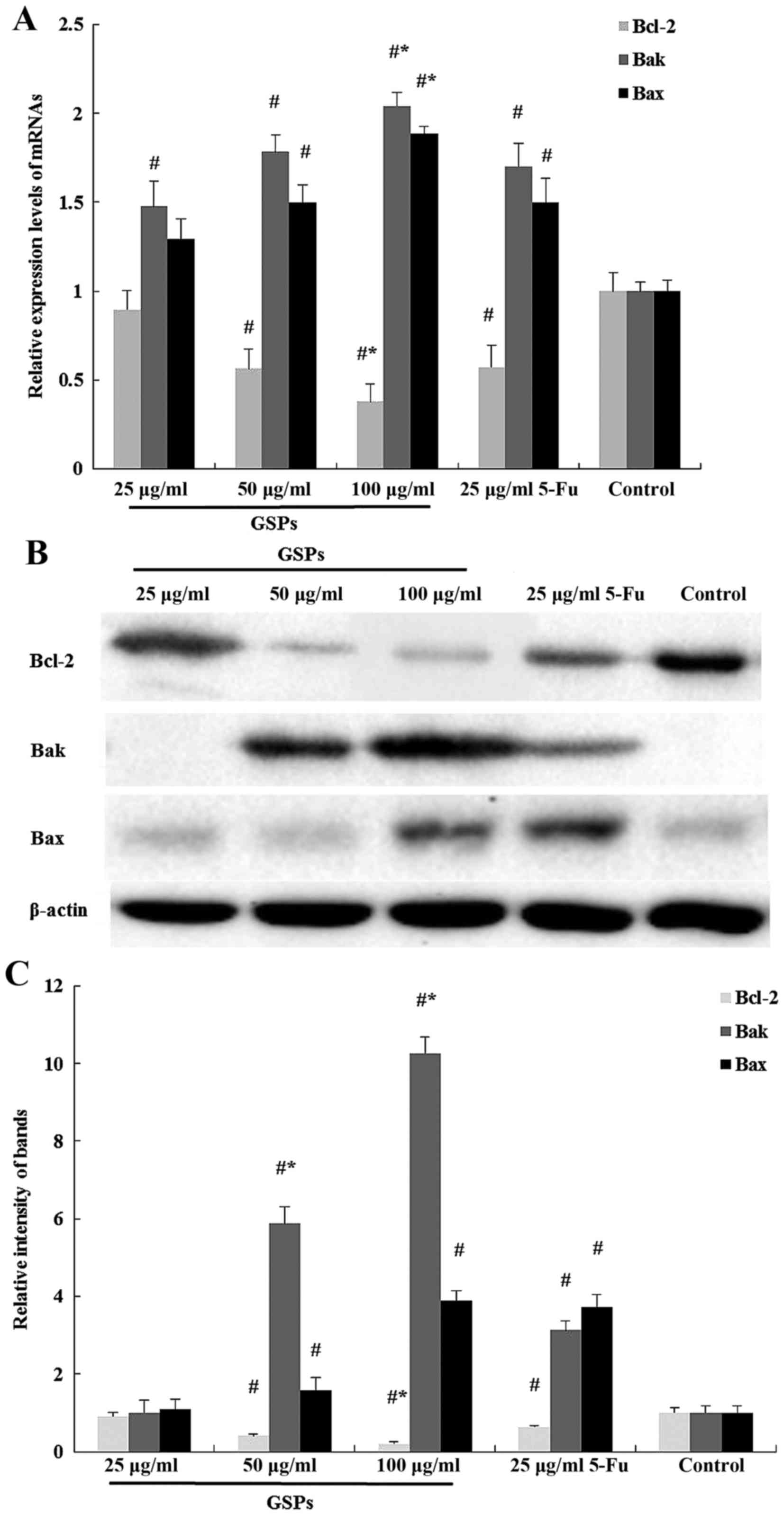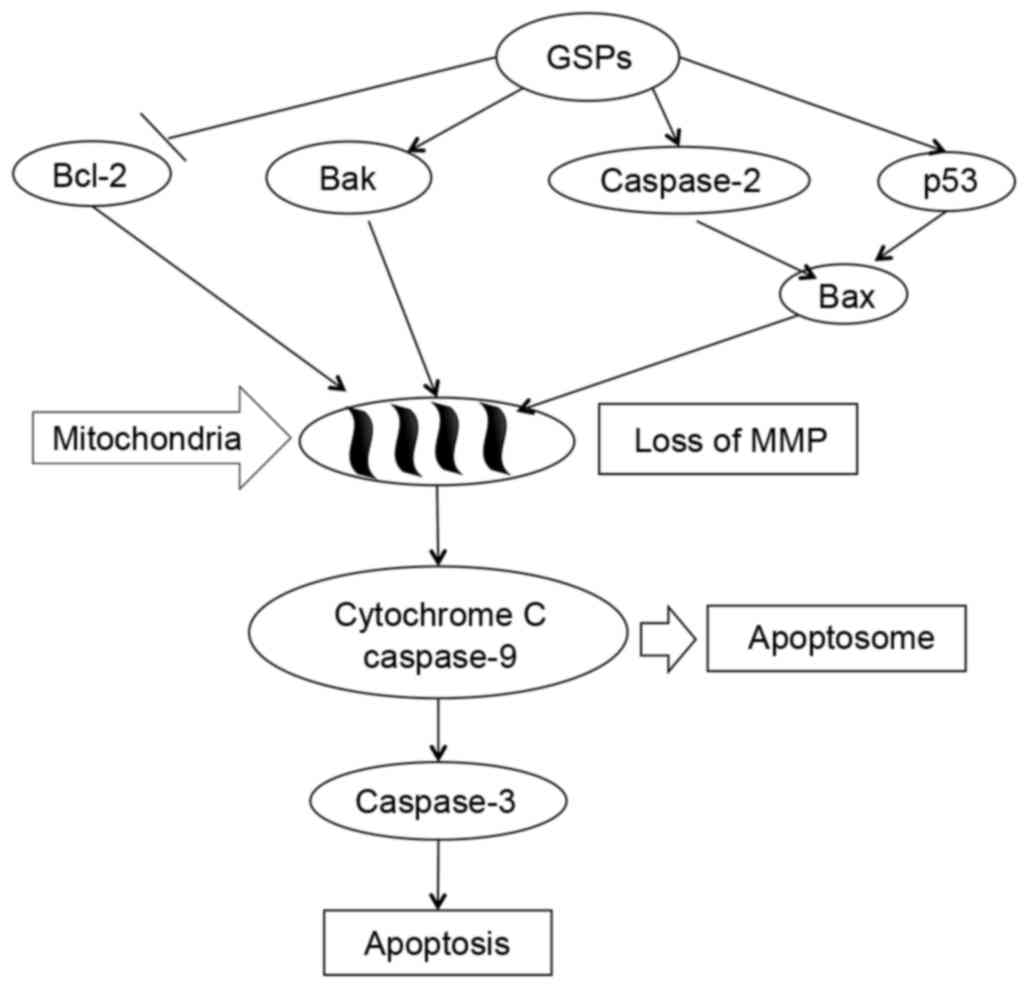|
1
|
Jemal A, Center MM, Ward E and Thun MJ:
Cancer occurrence. Methods Mol Biol. 471:3–29. 2009. View Article : Google Scholar : PubMed/NCBI
|
|
2
|
Jemal A, Bray F, Center MM, Ferlay J, Ward
E and Forman D: Global cancer statistics. CA Cancer J Clin.
61:69–90. 2011. View Article : Google Scholar : PubMed/NCBI
|
|
3
|
Jemal A, Siegel R, Xu J and Ward E: Cancer
statistics, 2010. CA Cancer J Clin. 60:277–300. 2010. View Article : Google Scholar : PubMed/NCBI
|
|
4
|
Markowitz SD and Bertagnolli MM: Molecular
origins of cancer: Molecular basis of colorectal cancer. N Engl J
Med. 361:2449–2460. 2009. View Article : Google Scholar : PubMed/NCBI
|
|
5
|
Wang X, Lu N, Yang Q, Gong D, Lin C, Zhang
S, Xi M, Gao Y, Wei L, Guo Q and You Q: Studies on chemical
modification and biology of a natural product, gambogic acid (III):
Determination of the essential pharmacophore for biological
activity. Eur J Med Chem. 46:1280–1290. 2011. View Article : Google Scholar : PubMed/NCBI
|
|
6
|
Zhang N, Yin Y, Xu SJ and Chen WS:
5-Fluorouracil: Mechanisms of resistance and reversal strategies.
Molecules. 13:1551–1569. 2008. View Article : Google Scholar : PubMed/NCBI
|
|
7
|
Jiang WQ, Fu FF, Li YX, Wang WB, Wang HH,
Jiang HP and Teng LS: Molecular biomarkers of colorectal cancer:
Prognostic and predictive tools for clinical practice. J Zhejiang
Univ Sci B. 13:663–675. 2012. View Article : Google Scholar : PubMed/NCBI
|
|
8
|
Mantena SK, Baliga MS and Katiyar SK:
Grape seed proanthocyanidins induce apoptosis and inhibit
metastasis of highly metastatic breast carcinoma cells.
Carcinogenesis. 27:1682–1691. 2006. View Article : Google Scholar : PubMed/NCBI
|
|
9
|
Silva RC, Cheynier V and Chemina A:
Procyanidin dimers and trimers from grape seeds. Phytochemistry.
30:1259–1264. 1991. View Article : Google Scholar
|
|
10
|
Prieur C, Rigaud J, Cheynier V and
Moutounet M: Oligomeric and polymeric procyanidins from grape
seeds. Phytochemistry. 36:781–789. 1994. View Article : Google Scholar
|
|
11
|
Vayalil PK, Mittal A and Katiyar SK:
Proanthocyanidins from grape seeds inhibit expression of matrix
metalloproteinases in human prostate carcinoma cells, which is
associated with the inhibition of activation of MAPK and NF kappa
B. Carcinogenesis. 25:987–995. 2004. View Article : Google Scholar : PubMed/NCBI
|
|
12
|
Singh RP, Tyagi AK, Dhanalakshmi S,
Agarwal R and Agarwal C: Grape seed extract inhibits advanced human
prostate tumor growth and angiogenesis and upregulates insulin-like
growth factor binding protein-3. Int J Cancer. 108:733–740. 2004.
View Article : Google Scholar : PubMed/NCBI
|
|
13
|
Agarwal C, Singh RP, Dhanalakshmi S and
Agarwal R: Anti-angiogenic efficacy of grape seed extract in
endothelial cells. Oncol Rep. 11:681–685. 2004.PubMed/NCBI
|
|
14
|
Mittal A, Elmets CA and Katiyar SK:
Dietary feeding of proanthocyanidins from grape seeds prevents
photocarcinogenesis in SKH-1 hairless mice: Relationship to
decreased fat and lipid peroxidation. Carcinogenesis. 24:1379–1388.
2003. View Article : Google Scholar : PubMed/NCBI
|
|
15
|
Shi J, Yu J, Pohorly J and Kakuda Y:
Polyphenolics in grape seeds-biochemistry and functionality. J Med
Food. 6:291–299. 2003. View Article : Google Scholar : PubMed/NCBI
|
|
16
|
Bagchi D, Bagchi M, Stohs S, Ray SD, Sen
CK and Preuss HG: Cellular protection with proanthocyanidins
derived from grape seeds. Ann N Y Acad Sci. 957:260–270. 2002.
View Article : Google Scholar : PubMed/NCBI
|
|
17
|
Tyagi A, Agarwal R and Agarwal C: Grape
seed extract inhibits EGF-induced and constitutively active
mitogenic signaling but activates JNK in human prostate carcinoma
DU145 cells: Possible role in anti-proliferation and apoptosis.
Oncogene. 22:1302–1316. 2003. View Article : Google Scholar : PubMed/NCBI
|
|
18
|
Sharma G, Tyagi AK, Singh RP, Chan DC and
Agarwal R: Synergistic anti-cancer effects of grape seed extract
and conventional cytotoxic agent doxorubicin against human breast
carcinoma cells. Breast Cancer Res Treat. 85:1–12. 2004. View Article : Google Scholar : PubMed/NCBI
|
|
19
|
Wang LS and Stoner GD: Anthocyanins and
their role in cancer prevention. Cancer Lett. 269:281–290. 2008.
View Article : Google Scholar : PubMed/NCBI
|
|
20
|
Finlay CA, Hinds PW and Levine AJ: The p53
proto-oncogene can act as a suppressor of transformation. Cell.
57:1083–1093. 1989. View Article : Google Scholar : PubMed/NCBI
|
|
21
|
Karpinich NO, Tafani M, Rothman RJ, Russo
MA and Farber JL: The course of etoposide induced apoptosis from
damage to DNA and p53 activation to mitochondrial release of
cytochrome c. J Biol Chem. 277:16547–16552. 2002. View Article : Google Scholar : PubMed/NCBI
|
|
22
|
Kastan MB, Onyekwere O, Sidransky D,
Vogelstein B and Craig RW: Participation of p53 protein in the
cellular response to DNA damage. Cancer Res. 51:6304–6311.
1991.PubMed/NCBI
|
|
23
|
Sherr CJ: Principles of tumor suppression.
Cell. 116:235–246. 2004. View Article : Google Scholar : PubMed/NCBI
|
|
24
|
Mercer WE, Shields MT, Amin M, Sauve GJ,
Appella E, Romano JW and Ullrich SJ: Negative growth regulation in
a glioblastoma tumor cell line that conditionally expresses human
wild-type p53. Proc Natl Acad Sci USA. 87:6166–6170. 1990.
View Article : Google Scholar : PubMed/NCBI
|
|
25
|
Baker SJ, Markowitz S, Fearon ER, Willson
JK and Vogelstein B: Suppression of human colorectal carcinoma cell
growth by wild-type p53. Science. 249:912–915. 1990. View Article : Google Scholar : PubMed/NCBI
|
|
26
|
Bagchi M, Kuszynski CA, Balmoori J, Joshi
SS, Stohs SJ and Bagchi D: Protective effects of antioxidants
against smokeless tobacco-induced oxidative stress and modulation
of Bcl-2 and p53 genes in human oral keratinocytes. Free Radic Res.
35:181–194. 2001. View Article : Google Scholar : PubMed/NCBI
|
|
27
|
Joshi SS, Kuszynski CA and Bagchi D: The
cellular and molecular basis of health benefits of grape seed
proanthocyanidin extract. Curr Pharm Biotechnol. 2:187–200. 2001.
View Article : Google Scholar : PubMed/NCBI
|
|
28
|
Jia G, Wang Q, Wang R, Deng D, Xue L, Shao
N, Zhang Y, Xia X, Zhi F and Yang Y: Tubeimoside-1 induces glioma
apoptosis through regulation of Bax/Bcl-2 and the ROS/Cytochrome
C/Caspase-3 pathway. Onco Targets Ther. 8:303–311. 2015.PubMed/NCBI
|
|
29
|
Oltvai ZN, Milliman CL and Korsmeyer SJ:
Bcl-2 heterodimerizes in vivo with a conserved homolog, Bax, that
accelerates programmed cell death. Cell. 74:609–619. 1993.
View Article : Google Scholar : PubMed/NCBI
|
|
30
|
Marzo I, Brenner C, Zamzami N,
Jürgensmeier JM, Susin SA, Vieira HL, Prévost MC, Xie Z, Matsuyama
S, Reed JC and Kroemer G: Bax and adenine nucleotide translocator
cooperate in the mitochondrial control of apoptosis. Science.
281:2027–2031. 1998. View Article : Google Scholar : PubMed/NCBI
|
|
31
|
Wang X: The expanding role of mitochondria
in apoptosis. Genes Dev. 15:2922–2933. 2001.PubMed/NCBI
|
|
32
|
Mohan J, Gandhi AA, Bhavya BC, Rashmi R,
Karunagaran D, Indu R and Santhoshkumar TR: Caspase-2 triggers
Bax-Bak-dependent and -independent cell death in colon cancer cells
treated with resveratrol. J Biol Chem. 281:17559–17611. 2006.
View Article : Google Scholar : PubMed/NCBI
|
|
33
|
Tian Z, Shen J, Moseman AP, Yang Q, Yang
J, Xiao P, Wu E and Kohane IS: Dulxanthone A induces cell cycle
arrest and apoptosis via up-regulation of p53 through mitochondrial
pathway in HepG2 cells. Int J Cancer. 122:31–38. 2008. View Article : Google Scholar : PubMed/NCBI
|
|
34
|
Budihardjo I, Oliver H, Lutter M, Luo X
and Wang X: Biochemical pathways of caspase activation during
apoptosis. Annu Rev Cell Dev Biol. 15:269–290. 1999. View Article : Google Scholar : PubMed/NCBI
|
|
35
|
Livak KJ and Schmittgen TD: Analysis of
relative gene expression data using real-time quantitative PCR and
the 2(-Delta Delta C(T)) method. Methods. 25:402–408. 2001.
View Article : Google Scholar : PubMed/NCBI
|
|
36
|
Zhao J, Wang J, Chen Y and Agarwal R:
Anti-tumor-promoting activity of a polyphenolic fraction isolated
from grape seeds in the mouse skin two-stage initiation-promotion
protocol and identification of procyanidin B5-3′-gallate as the
most effective antioxidant constituent. Carcinogenesis.
20:1737–1745. 1999. View Article : Google Scholar : PubMed/NCBI
|
|
37
|
Kamei H, Hashimoto Y, Koide T, Kojima T
and Hasegawa M: Anti-tumor effect of methanol extracts from red and
white wines. Cancer Biother Radiopharm. 13:447–452. 1998.
View Article : Google Scholar : PubMed/NCBI
|
|
38
|
Kang SY, Seeram NP, Nair MG and Bourquin
LD: Tart cherry anthocyanins inhibit tumor development in ApcMin
mice and reduce proliferation of human colon cancer cells. Cancer
Letts. 194:13–19. 2003. View Article : Google Scholar
|
|
39
|
Roy AM, Baliga MS, Elmets CA and Katiyar
SK: Grape seed proanthocyanidins induce apoptosis through p53, Bax,
and caspase 3 pathways. Neoplasia. 7:24–36. 2005. View Article : Google Scholar : PubMed/NCBI
|
|
40
|
McCurrach ME, Connor TM, Knudson CM,
Korsmeyer SJ and Lowe SW: Bax-deficiency promotes drug resistance
and oncogenic transformation by attenuating p53-dependent
apoptosis. Proc Natl Acad. 94:2345–2349. 1997. View Article : Google Scholar
|
|
41
|
Yin C, Knudson CM, Korsmeyer SJ and Van
Dyke T: Bax suppresses tumorigenesis and stimulates apoptosis in
vivo. Nature. 385:637–640. 1997. View Article : Google Scholar : PubMed/NCBI
|
|
42
|
Ryan KM, Phillips AC and Vousden KH:
Regulation and function of the p53 tumor suppressor protein. Curr
Opin Cell Biol. 13:332–337. 2001. View Article : Google Scholar : PubMed/NCBI
|
|
43
|
Shih PH, Yeh CT and Yen GC: Effects of
anthocyanidin on the inhibition of proliferation and induction of
apoptosis in human gastric adenocarcinoma cells. Food Chem Toxicol.
43:1557–1566. 2005. View Article : Google Scholar : PubMed/NCBI
|





















